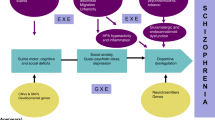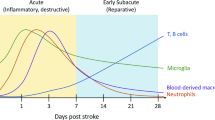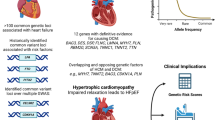Abstract
Stroke represents a clinical syndrome rather than a single disease. A number of stroke subtypes can be distinguished based on careful phenotyping, with each of these having distinct and overlapping risk factor profiles. Recent evidence has suggested that genetics plays an important part in stroke risk, with at least 2 genes specific to stroke risk directly now having been identified. This review will explore our current understanding of the genetics underlying stroke risk and whether this information is currently useful in a clinical setting for patient benefit.
Similar content being viewed by others
References
Papers of particular interest, published recently, have been highlighted as: • Of importance •• Of major importance
Roger V, Go A, Lloyd-Jones DM, Benjamin EJ, Berry JD, Borden WB, et al. Heart disease and stroke statistics - 2012 update: a report from the American Heart Association. Circulation. 2012;125:e2–220.
Seshadri S, Beiser A, Kelly-Hayes M, Kase C, Au R, Kammel W, et al. The lifetime risk of stroke: estimates from the Framingham study. Stroke. 2006;37:345–50.
Viswanathan A, Rocca WA, Tzourio C. Vascular risk factors and dementia: how to move forward? Neurology. 2009;72:368–74.
Zhang J, Claterbuck RE. Molecular genetics of human intracranial aneurysms. Int J Stroke. 2008;3:272–87.
Sacco R, Ellenberg J, Mohr J, Tatemichi T, Hier D, Price T, et al. Infarcts of undetermined cause: the NINDS stroke data bank. Ann Neurol. 1989;25:382–90.
Joutel A, Corpechot C, Ducros A, Vahedi K, Chabriat H, Mouton P, et al. Notch3 mutations in CADASIL, a hereditary adult-onset condition causing stroke and dementia. Nature. 1996;383:707–10.
Hassan A, Markus HS. Genetics and ischaemic stroke. Brain. 2000;123:1784–812.
Flossmann E, Schulz U, Rothwell P. Systematic review of methods and results of studies of the genetic epidemiology of ischaemic stroke. Stroke. 2004;35:212–27.
Jerrard-Dunne P, Cloud G, Hassan A, Markus HS. Evaluating the genetic component of ischaemic stroke subtypes - a family history study. Stroke. 2003;34:1364–9.
Duggirala R, Gonzalez Villalpando C, O'Leary DH, Stern MP, Blangero J. Genetic basis of variation in carotid artery wall thickness. Stroke. 1996;27(5):833–7.
Jartti L, Ronnemaa T, Kaprio J, Jarvisalo MJ, Toikka JO, Marniemi J, et al. Population-based twin study of the effects of migration from Finland to Sweeden on endothelial functrion and intima-media thickness. Arterioscler Thromb Vasc Biol. 2002;22(5):832–7.
Moskau S, Golla A, Grothe C, Boes M, Pohl C, Klockgether T. Heritability of carotid artery atherosclerotic lesions. Stroke. 2005;36:5–8.
Carmelli D, DeCarli C, Swan G, Jack L, Reed T, Wolf P, et al. Evidence for genetic variance in white matter hyperintensity volume in normal elderly male twins. Stroke. 1998;29:1177–81.
Atwood L, Wolf P, Heard-Costa N, Massaro J, Beiser A, D'Agostino R, et al. Genetic variation in white matter hyperintensity volume in the Framingham study. Stroke. 2004;35:1609–13.
Turner S, Fornage M, Jack C, Mosley T, Knopman D, Kardia S, et al. Genomic susceptibility loci for brain atrophy, ventricular volume and leukoaraiosis in hypertensive sibships. Arch Neurol. 2009;66:847–57.
Markus HS. Unravelling hte genetics if ischaemic stroke. PLoS Med. 2010;7:e1000225.
Dichgans M, Markus HS. Genetic association studies in stroke: methodological issues and proposed standard criteria. Stroke. 2005;36:2027–31.
Martini SRFM, Brown WM, Haverbusch M, Comeau ME, Sauerbeck LR, Kissela BM, et al. Risk factors for intracerebral hemorrhage differ according to hemorrhage location. Neurology. 2012;79:2275–82.
Edwards A, Ritter R, Abel K, Manning A, Panhuysen C, Farrer L. Complement factor H polymorphism and age-related macular degeneration. Science. 2005;308:421–4.
Hardy J, Singleton A. Genomewide association studies and human disease. N Eng J Med. 2009;360:1759–68.
Schunkert H, Gotz A, Braund P, McGinnis R, Tregouet D-A, Mangino M, et al. Repeated replication and a prospective meta-analysis of the association between chromosome 9p21.3 and coronary artery disease. Circulation. 2008;117:1675–84.
Gudbjartsson D, Arnar D, Helgadottir A, Gretarsdottir S, Holm H, Sigurdsson A, et al. Variants conferring risk of atrial fibrillation on chromosome 4q25. Nature. 2007;448(353):358.
Gudbjartsson D, Holm H, Gretarsdottir S, Thorleifsson G, Walters G, Thorgeirsson G, et al. A sequence variant in ZFHX3 on 16q22 associates with arterial fibrillation and ischaemic stroke. Nat Genet. 2009;41:876–8.
Gschwendtner A, Bevan S, Cole J, Plourde A, Matarin M, Ross-Adams H, et al. Sequence variants on Chromosome 9p21.3 confer risk for atherosclerotic stroke. Ann Neurol. 2009;65:531–9.
Gretarsdottir S, Thorleifsson G, Manolescu A, Styrkarsdottir U, Helgadottir A, Gschwendtner A, et al. Risk variants for atrial fibrillation on chromosome 4q25 associate with ischaemic stroke. Ann Neurol. 2008;64:402–9.
Matarin M, Brown W, Scholz S, Simon-Sanchez J, Fung H-C, Hernandez D, et al. A genome wide genotyping study in patients with ischaemic stroke: initial analysis and data release. Lancet Neurol. 2007;6:414–20.
Ikram A, Seshadri S, Bis J, Fornage M, DeStefano A, Aulchenko Y, et al. Genomewide association studies of stroke. N Eng J Med. 2009;360:1718–28.
International Stroke Genetic Consortium and Wellcome Trust Case Control Consortium 2. Failure to validate association between 12p13 variants and ischaemic stroke. N Eng J Med. 2010;362:1547–50.
•• Bellenguez C, Bevan S, Gschwendtnew A, Spencer C, Burgess AI, Pirinen M, et al. Genetic analysis identifies a new susceptibility locus in HDAC9 for large vessel ischemic stroke, and supports genetic heterogeneity across stroke subtypes. Nat Genet. 2012;44:328–33. First use of GWAS to identify genetic predisposition to ischaemic stroke showing successful and robust replication.
Markus HS, Makela K-M, Bevan S, Raitoharju E, Oksala N, Bis JC, et al. Evidence HDAC9 genetic variant associated with ischaemic stroke increases risk via promoting carotid atherosclerosis. Stroke 2013;In Press.
Bowes AJ, Khan MI, Shi Y, Robertson L, Werstuck GH. Valproate attenuates accelerated atherosclerosis in hyperglycemic ApoE deficient mice: Evidence in support of a role for endoplasmic reticulum stress and glycogen synthase kinase-3 in lesion development and hepatic stenosis. Am J Pathol. 2009;174:330–42.
Olesen JB, Abildstrom SZ, Erdal J, Gislason GH, Weeke P, Andersson C, et al. Effects of epilepsy and selected antiepileptic drugs on risk of myocardial infarction, stroke and death in patients with or withour previous stroke: a nationwide cohort study. Pharmacoepidemiol Drug Saf. 2011;20:964–71.
• Holliday EG, Maguire J, Evans T-J, Koblar S, Jannes J, Sturm J, et al. Common variants at 6p21.1 are associated with large artery atherosclerotic stroke. Nat Genet. 2012. doi:10.1038/ng.2397. Second GWAS based gene identification specific to ischaemic stroke with robust replication.
•• Traylor M, Farrall M, Holliday E, Sudlow C, Hopewell J, Cheng Y-C, et al. Genetic risk factors for ischaemic stroke and its subtypes (the METASTROKE collaboration): a meta-analysis of genome-wide association studies. Lancet Neurol. 2012;11:951–62. Largest and most powered genetic meta-analysis of GWAS based stroke studies published to date.
Williams FMK, Carter AM, Hysi PG, Surdulescu G, Hodgkiss D, Soranzo N, et al. Ischaemic stroke is associated with the ABO locus: The EuroCLOT study. Ann Neurol. 2012;73:16–31.
Manolio TA, Collins FS, Cox NJ, Goldstein DB, Hindorff LA, Hunter DJ, et al. Finding the missing heritability of complex disease. Nature. 2009;461:747–53.
Yang J, Lee S, Goddard M, Visscher P. GCTA: a tool for genome wide complex trait analysis. Am J Hum Genet. 2011;88:76–82.
Bevan S, Traylor M, Adib-Samii P, Malik R, Paul NLM, Jackson C, et al. Genetic heritability of ischaemic stroke and the contribution of previously reported candidate gene and genomewide associations. Stroke. 2012;43:3161–7.
Metzker M. Sequencing technologies - the next generation. Nat Rev Genet. 2010;11:31–46.
Lin B, Clyne M, Walsh M, Gomez O, Yu W, Gwinn M, et al. Tracking the epidemiology of human genes in the literature: the HuGE published literature database. Am J Epidemiol. 2006;164:1–4.
Wang L, McLeod HL, Weinshilboum RM. Genomics and drug response. N Eng J Med. 2011;364:1144–53.
Goodman T, Ferro A, Sharma P. Pharmacogenetics of aspirin resistance: a comprehensive systematic review. BJCP. 2013. doi:10.1111/j.1365-2125.2008.03183.x.
Neubauer H, Kaiser A, Endres H, Kruger J, Engelhardt A, Lask S, et al. Tailored antiplatelet therapy can overcome clopidogrel and aspirin resistance - the BOchum CLopidogrel and Aspirin Plan (BOCLA-Plan) to improve antiplatelet therapy. BMC Med. 2011. doi:10.1186/1741-7015-9-3:3.
CAPRIE Steering Committee. A randomised, blinded, trial of clopidogrel versus aspirin in patients at risk of ischaemic events (CAPRIE). CAPRIE Steering Committee. Lancet. 1996;348:1329–39.
Diener HC, Sacco RL, Yusuf S, Cotton D, Ounpuu S, Lawton WA, et al. Effects of aspirin plus extended release dipyridamole versus clopidogrel and telmisartan on disability and cognitive function after recurrent stroke in patients with ischaemic stroke in the prevention regimen for effectively avoiding second strokes (PRoFESS) trial: a double-blind, active and placebo-controlled study. Lancet Neurol. 2008;7:875–84.
Mega JL, Close SL, Wiviott SD, Shen L, Hockett RD, Brandt JT, et al. Cytochrome P450 polymorphisms and response to clopidogrel. N Eng J Med. 2009;360:354–62.
Sibbing D, Bernlochner I, Kastrati A, Pare G, Eikelboom JW. Current evidence for genetic testing in clopidogrel treated patients undergoing coronary stenting. Circ Cardiovasc Interv. 2011;4:505–13.
Pare G, Eikelboom JW, Sibbing D, Bernlochner I, Kastrati A. Testing should not be done in all patients treated with clopidogrel who are undergoing percutaneous coronary intervention. Circ Cardiovasc Interv. 2011;4:514–21.
Wysowski DK, Nourjah P, Swartz L. Bleeding complications with warfarin use: a prevalent adverse effect resulting in regulatory action. Arch Intern Med. 2007;167:1414–9.
Manolopoulos VG, Ragia G, Tavridou A. Pharmacogenetics of coumarinic oral anticoagulants. Pharmacogenomics. 2010;11:493–6.
Ja J, Gong L, Whirl-Carrillo M, Gage BF, Scott SA, Stein CM, et al. Clinical pharmacogenetics implementation consortium guidelines for CYP2C9 and VKORC1 genotypes and warfarin dosing. Clin Pharmacol Ther. 2011;90:625–9.
Conflict of Interest
Steve Bevan and Hugh S Markus declare that they have no conflict of interest.
Human and Animal Rights and Informed Consent
This article does not contain any studies with human or animal subjects performed by any of the authors.
Author information
Authors and Affiliations
Corresponding author
Additional information
This article is part of the Topical Collection on Cardiovascular Disease and Stroke
Rights and permissions
About this article
Cite this article
Bevan, S., Markus, H.S. Genetic Profiles in Ischaemic Stroke. Curr Atheroscler Rep 15, 342 (2013). https://doi.org/10.1007/s11883-013-0342-8
Published:
DOI: https://doi.org/10.1007/s11883-013-0342-8




